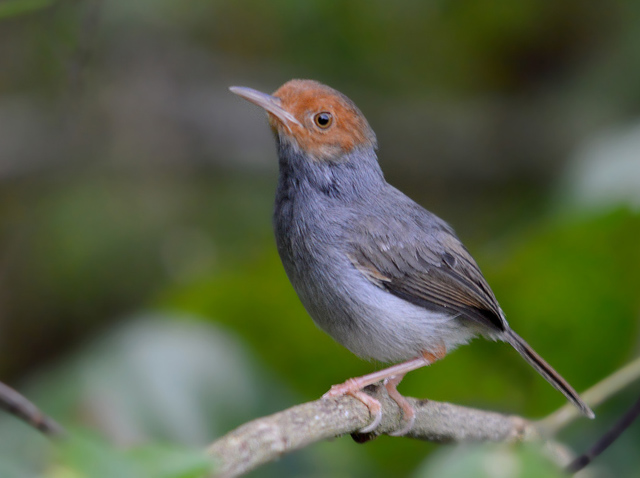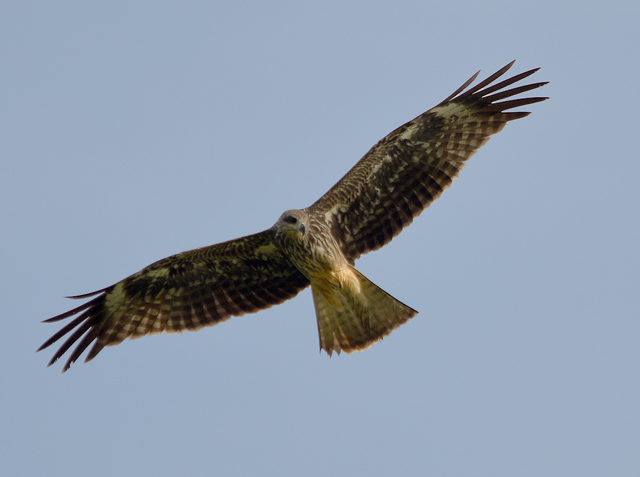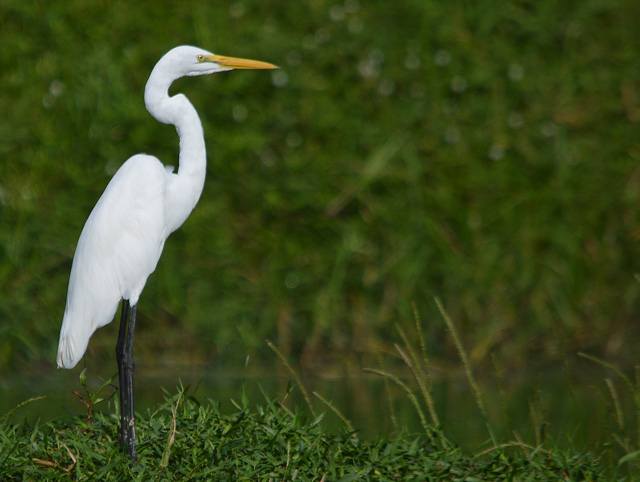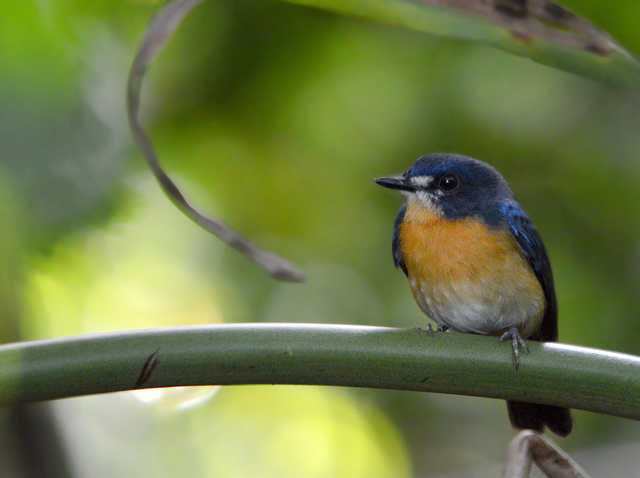The
morning was bright and beautiful as I made my way across the Straits of
Malacca. Initially, I just wanted to do some casual birding on the island but
not a single locality came to mind. Utterly fatigued from the insane work load of
my fulltime occupation, to make a long trip today was simply out of the
question. The next best thing was to visit a local patch in mainland Penang and
since choice is never a luxury there as well, I found myself wandering about
the network of concrete boardwalks at Air Hitam Dalam again.
Perched
conspicuously at the edge of the freshwater swamp forest was a Brown Shrike on
the hunt. This common migrant can hardly be considered a sought-after species
but the composition was so inviting and the bird, exceptionally obliging.
I found the forest eerily quiet today. This birding haunt has lost much of its luster of late – just like most other sites I frequently visit. As my footsteps grew heavier, my thoughts started to drift until a vocalizing Ashy Tailorbird shattered the silence. It took some effort and patience before I found the bird and it turned out to be a handsome male. It is amazing that a small bird like the Ashy Tailorbird can cause such a ruckus. He certainly had the place all to himself this morning and that indirectly increased the decibel of his persistent territorial call.
The
Air Hitam Dalam Educational Forest is a small site and with absolutely no relevance at
all, it is also home to the tiny but deadly Black-thighed Falconets. The top of
this particular dead tree is not exactly ideal to capture the smallest bird of
prey in the world due to its height but it is one of their favourite perches. And
sure enough, I could just make out a single bird present with my naked eye upon
my approach.
It
was joined later by another of its kin and judging from the amount of public
affection exhibited, they are most likely a breeding pair. Like all raptors, the larger bird is most likely the fairer sex. There is no denying
the stunning beauty of Black-thighed Falconets and naturally, I found it hard to pull
myself away from the lovebirds.
However,
do not be fooled by the adorable appearance of the Black-thighed Falconet. It
is an accomplished predator in its own right and this unfortunate dragonfly found
that out a little too late.
At this site, a congregation of raptors leisurely soaring about can only be the wintering Black Kites. I quickly repositioned myself in order to have the lighting in my favour. About a dozen of these raptors were present today and a few of them circled exhilaratingly close overhead.
Sleek
and elegant, the Black Kites floated and swerved their way to become one of the
main highlights of this short trip. The sunny condition aided my photographic
efforts. And the number of images shared here in this post will be able to
accurately illustrate my feelings during the encounter.
One
last photograph for good measure...
Unlike
the winter visitors, there is only one resident pair of Brahminy Kites here and
the rising temperature set them soaring about the vicinity as well. Although
they are more vibrantly coloured, the Brahminy Kites did not provide much
opportunity for this quality to be admired as they were skittish as usual.
Raptors
are one of my favourite birds and I am sure I do not speak for myself. Their
ferocity and majesty are often incomparable. When the piercing call of the
Crested Serpent-Eagle filled the vicinity, I could hardly contain my
excitement. The presence of so many raptors in such a short time can be
overwhelming to say the least and I intently watched this eagle with a taste
for cold-blooded prey conduct an aerial patrol of its domain.
Although
it is not a bird of prey, the Asian Openbill casts a familiar silhouette in the
sky during this time of day. This stork that can sometimes number up to a
hundred strong, soars effortlessly on its immense wings and is quite a sight to
behold.
Like
the Asian Openbill, the Little Cormorant is also a recent colonizer to
Peninsular Malaysia that is settling in well indeed. This lone bird, presumably
taking a breather after raiding the commercial fish ponds, drew my gaze back to
ground level. Big flocks are not commonly encountered in my home state and more
often than not, it is particularly wary of human presence. Luckily, there was a
lot of objects to help hide my human form as I stalked this skilled hunter.
Egrets
of all shape and sizes also loiter around the ponds with the same intentions.
Like the name implies, the Great Egret is by far the largest and undeniably regal.
The
Little Egret may not be the smallest by it is still dwarfed by the presence of
the Great Egret.
An
adult Purple Heron tried its best to remain inconspicuous while resting at the
edge of the fish farm but its plumage colouration was just too attractive not
to take notice.
Decades
of birding should have made me an observant man and yet, I did not realize
there was an adult Grey Heron in the vicinity until it took flight set off no
doubt by my intrusion. It alighted on a nearby tree and this lucky shot of the
landing turned out better than I had anticipated.
Some
movement among a patch of long grass turned out to be a pair of White-rumped
Munias feeding on grass seeds. The availability of food made them reasonably confiding
and I took the time to observe the feast. Munias are considered to pests by the
agricultural industry but to me, they are just living things trying to survive
in this hostile world.
Due
to its abundant nature, the Pacific Swallow is usually ignored. That is a real
shame because when seen in good light, this aerial specialist is strikingly
beautiful and streamlined to perfection.
I
have had enough share of leech bites to know when I have fallen victim again to
this blood-sucking parasite. It may have been a long time since the last time but
there was no mistaking the squishy feeling between my toes. As I was about to
attend to this little inconvenience, the cheerful song of the Black-naped
Oriole distracted me from the task at hand. The leech bite can wait but this stunning
bird will not. Although it even occurs in residential areas, I find it difficult
to obtain decent images. And here, along the line of tall riverine trees, it is
not any easier.
I
would have walked past this female Mangrove Blue-Flycatcher on the way to my
parked car if not for her short burst of song. The forest undergrowth can
sometimes be a challenging environment for photography and my modest gear could
not capture her true beauty on this occasion. This species is not as prominent
here as it used to be and that is disheartening. But her presence today meant
that there is still hope and what better to end a birding excursion than on a positive
note.


























2 comments:
A great posting Wai Mun. Considering what you call the lack of lustre of Air Hitam dalam nowadays you certainly still had some great shots, especially of the assorted raptors. It seems they have repaired those boardwalks since my last visit early last year. I can't wait to return to share your loved hobby. Merry xmas to you and your family and thanks for sharing the joys of A.I.D.
Merry Christmas, Kieron. Yes, they have done some repairs there. Looking forward to your visit. Thank you for your commment.
Post a Comment